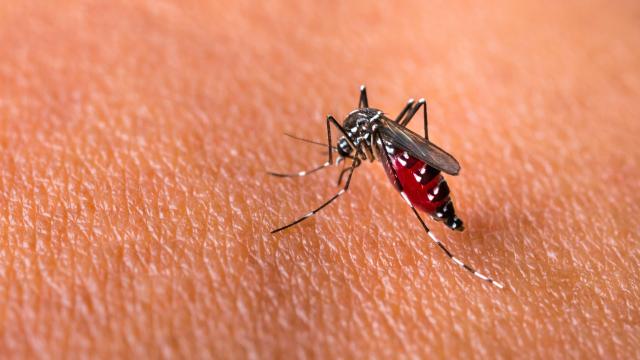Researchers in Japan say they’ve discovered “super” resistant mosquitoes in Asia. In a study published this week, they detail finding populations of Aedes aegypti mosquitoes — a common disease vector — in Vietnam and Cambodia carrying several mutations believed to confer strong protection against the most widely used insecticides. The discovery should merit urgent action to prevent these mutations from spreading globally, they argue.
A. aegypti mosquitoes are one of the most prolific sources of human misery in the world, thanks in part to the wide assortment of germs they can transmit to us. These mosquito-borne diseases include yellow fever, dengue, Zika, and chikungunya, to name a few. The global presence of A. aegypti (along with a related species, A. albopictus) and the diseases they spread has expanded in recent years. Many experts expect their range to only grow wider over the coming decades as the climate continues to warm, including throughout the southern and eastern parts of the United States. So these new findings, published Wednesday in Science Advances, might add yet another concern to an already serious problem.
The research was led by scientists from Japan’s National Institute of Infectious Diseases, the country’s equivalent to the National Institute of Allergy and Infectious Diseases (NIAID) in the U.S. They studied samples of A. aegypti mosquitoes recently collected throughout Asia, looking specifically for mutations in their voltage-gated sodium channel gene. Some mutations in this gene, called knockdown mutations, can help mosquitos and other insects survive exposure to pyrethroids, a class of chemicals commonly used to control insect populations. To test whether any of the mutations found by the researchers truly protected the mosquitos, they also compared their survival rates against the insecticides to non-resistant mosquitoes in the lab.
The team ultimately identified 10 previously unknown substrains of A. aegypti mosquitoes that seemed to carry one or more of these knockdown mutations. One novel mutation in particular, called a L982W substitution, was found in over 78% of mosquitoes from both countries. And in a specific area of Cambodia, about 90% of mosquitoes carried one of two pairs of mutations that were identified as especially troubling.
Lab experiments also found that these combination mutation-carrying mosquitoes were much harder to kill, with “substantially higher levels of pyrethroid resistance than any other field population ever reported,” the team wrote. In the title of their paper, they describe their results as the “discovery of super-insecticide-resistant dengue mosquitoes in Asia.”
Other studies in recent years have found evidence of growing pyrethroid resistance among A. aegypti mosquitoes in Asia and the Americas, both in the lab and the real world. And the new study is the latest in the team’s ongoing research project to understand pyrethroid resistance in A. aegypti globally. They say it’s the first to try unravelling the molecular mechanisms that have led to these mutations emerging, particularly in the mosquitos from Cambodia.
There are developing non-insecticide technologies that might someday better keep mosquitoes in check, such as sterile insect techniques that sabotage the population from within, but none of these interventions are expected to see widespread use soon. There is also a newer class of insecticides, called neonicotinoids, that’s beginning to be deployed more often against mosquitoes. But these chemicals are controversial due to their damaging effects on important insect pollinators, and there are already signs that mosquitoes have begun to adapt to them as well. There are also no highly effective and/or low-cost vaccines and treatments for the most common diseases that these mosquitos spread, especially dengue.
All of this means that pyrethroids will remain a widely used tool against A. aegypti mosquitoes for the time being. Given that, much more has to be done to keep these worrying mutations from spreading around the world before it’s too late. The L982W mutation hasn’t been found in mosquitoes outside of Vietnam and Cambodia yet, for instance. But “it may be spreading to other areas of Asia, which can cause an unprecedentedly serious threat to the control of dengue fever as well as other Aedes-borne infectious diseases,” the researchers warn.
